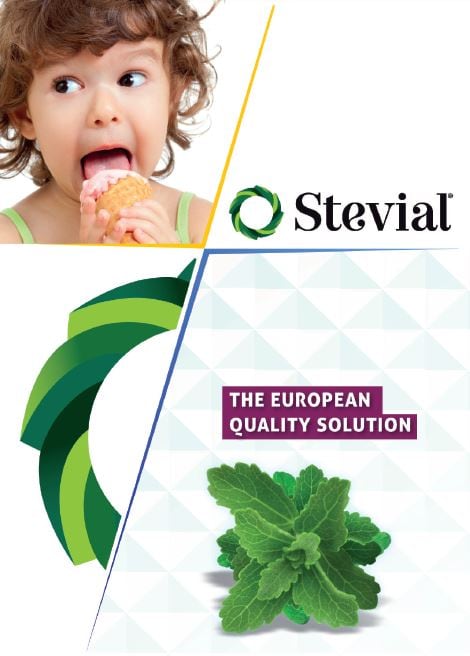Food and beverage manufacturers face a relatively-new, increasingly-intense market force. Delivering great-tasting products at the right price is no longer enough. Today’s consumers want products that are low in sugar, healthy and use naturally-derived ingredients from sustainable, traceable supply chains. Meeting these demands requires specialized knowledge and capabilities. Stevial is a rare example of a European company with those assets — and it is sharing its skill set with its customers.
The importance of adapting product lines to anti-sugar, healthy-eating trends is clear in the data. A 2016 survey of 2,500 European adults found 60% of people monitor how much sugar they consume. Many of the respondents seek out low-sugar products and factor the type of sweetener used into their buying decisions. Ingredients perceived to be healthier and more natural than sugar or artificial sweeteners, such as the plant-derived, zero-calorie stevia, found favor with many consumers.
Stevia has established itself as a go-to sweetener for some informed consumers because it meets two of the key trends driving their purchasing decisions. As a zero-calorie ingredient, stevia gives every consumer a way to cut their sugar consumption while continuing to cater for their sweet tooth. That is one driver.
The other driver is the demand for “natural” products. In the past, many consumers who wanted to cut out sugar plumped for products containing artificial sweeteners. However, such sweeteners have fallen out of favor with some people, who are now looking for products they perceive to be natural. Stevial, a plant-derived sweetener of natural origin, fits the bill.
Two regulatory trends are also driving interest in stevia. Firstly, incoming or recently-introduced sugar taxes in Ireland, Portugal and the UK — plus changes to France’s position — are encouraging manufacturers to consider new ways to sweeten their products. At the same time, the European Union is liberalizing its attitude to the use of stevia, opening the door to the use of the plant in tea and herbal infusions.
Both trends look set to continue as regulators search for ways to curb sugar-related health problems and become increasingly comfortable with stevia, which has a short history of use in the EU. Japan, where stevia is well established, provides a case study in how the sweetener can be used extensively in a range of products and could reshape the European food and drink sectors in the years to come.
To stay on the right side of these consumers and regulatory trends, manufacturers need to understand how to sustainably incorporate stevia into their product lines while consistently delivering the taste and texture their customers expect. Stevial was founded to help companies achieve these goals.
The value of a short supply chain
Stevial is a joint venture between four companies with complementary skills. Each company has a stake in Stevial. That gives Stevial unusually-broad expertise — which is deployed internally and shared with customers — covering the sourcing, production, formulation and distribution of stevia.
The early steps in this process are central to what sets Stevial apart. While most stevia is grown and processed in the Americas and Asia, Stevial has established a supply chain local to its European customers. Most of the stevia processed at the Stevia Natura facility in Riom, France is grown in Southern Europe and North Africa. By 2020, Stevial aims to source all of its stevia from farmers in Europe.
In working toward that goal, Stevia Natura is entering into multi-year contracts with farmers and helping them to extract more value from their land, for example by switching from tobacco crops to stevia. This close, collaborative approach allows Stevial to ensure the plants that provide leaves for its products are grown using responsible, sustainable practices and harvested, dried and sorted to its own standards.
The result is a short, traceable, low carbon and European supply chain that gives Stevial considerable control over quality and sustainability, enabling it to meet consumers’ demands for these attributes and manufacturers’ need for ingredients with consistent attributes.
Once harvested, the stevia leaves make the short trip to a facility near the city of Clermont-Ferrand in central France. Stevia Natura, one of four companies in the Stevial joint venture, runs the factory and uses a water-based process to extract the stevia ingredient from the leaves. This process has been developed by the pioneer of Stevia in Europe, Stevia Natura CEO Joël Perret, to be efficient and as clean as possible.
“We have developed a new process based on water and agricultural alcohol (ethanol). This does not require any chemical solvent or genetically modified organisms or biotechnological process in the extraction and purification of the sweetener” Perret said. Stevia Natura then applies quality control tests to ensure the attributes of the end product are consistent throughout the year.
Distribution of the up to 50 tonnes of ingredients made at the French facility each year is handled by two of the other companies that set up Stevial. Between them, Cristalco and Lavollee’s Firmalis have experience shipping sweeteners to small, European businesses and larger, multinational operations. Stevial has this dual-distributor approach so it can cater for the specific needs of all its customers, whatever their size.
Helping customers use stevia
Taking stevia from seed to shipped sweetener is the backbone of Stevial’s operation but, crucially, its team is also equipped to help customers understand how to use the ingredient. Stevial’s formulation expertise comes from the fourth and final member of the joint venture, aroma and flavour specialist Mane.
Mane plays an important role in the service Stevial provides to customers. Many European food and beverage manufacturers have limited experience of formulating products containing stevia. As the behavior of stevia extracts varies from application to application — for example between beverage and dairy products — the lack of experience can lead to frustrations and delays as companies grapple with the nuances of an unfamiliar ingredient.
In Mane, Stevial has access to experts that can help companies identify the most effective ways to add stevia to their lines and create products with the taste, texture and aroma consumers expect.
This support is central to Stevial’s offering and extends beyond formulation. Leveraging the combined capabilities of its four founding companies through its Lab’In Riom co-design model, Stevial strives to put customers in touch with the person who can address their issues, whether they relate to logistics, formulation, regulations or any other stevia-related topic.
That makes Stevial more than just a supplier of a sustainable, no-calorie, naturally-derived sweetener tailored to current consumer demands. Stevial also helps customers understand how to use stevia, enabling them to meet the needs of today’s consumers and foresee how trend shifts and regulatory changes will open up new opportunities in the future.



